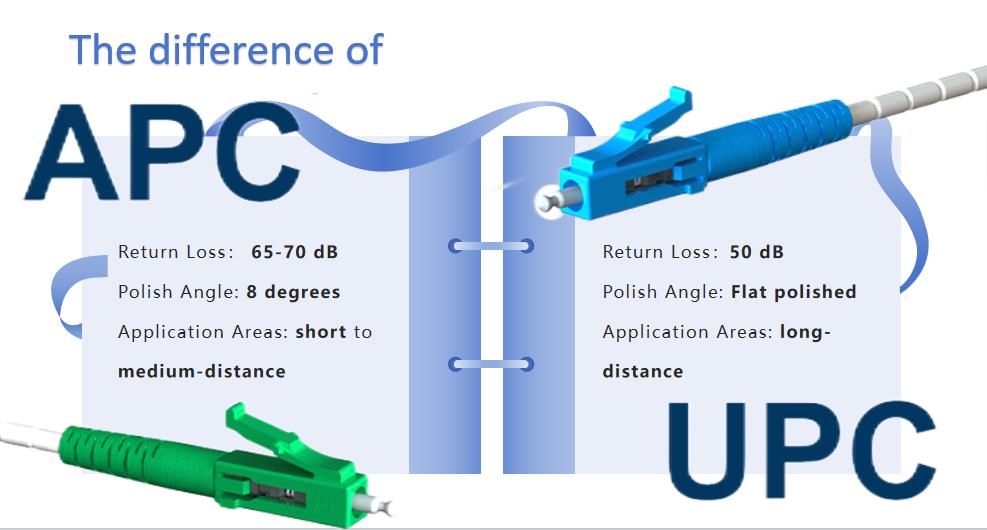Which Is Better: APC or UPC fiber optic connector? A Guide to Understanding Fiber Optic Connectors
When it comes to fiber optic networks, one of the key components for ensuring high-quality data transmission is the connector used to link fibers. Two of the most commonly utilized types of fiber optic connectors are APC (Angled Physical Contact) and UPC (Ultra Physical Contact). Each has distinct advantages and is suited for different applications in networking. But which one is superior? Let’s take a closer look at the UPC APC fiber difference in fiber optic connectors, their benefits, and their typical applications.
Understanding APC and UPC Fiber Connectors

UPC (Ultra Physical Contact)
· Design: The UPC fiber connectors has a flat end face that ensures optimal physical contact between the fiber cores. The surface of the connector is polished flat, allowing for direct contact when two connectors are mated.
· Performance: UPC fiber optic connector offers exceptional return loss (the amount of light that bounces back) of around 50 dB, which is beneficial for high-speed communication. However, due to their flat end face, there is an increased potential for light reflection when two connectors are mated.
· Applications: UPC connectors are widely used in telecommunications, data centers, and local area networks (LANs). They are especially useful in environments where minimal signal loss is essential, but the higher return loss associated with UPC connection is not a significant concern.

APC (Angled Physical Contact)
· Design: The key difference with APC connectors is that the end face of the fiber is polished at an 8-degree angle. This angle minimizes the amount of light reflected back into the fiber, thereby significantly improving signal quality.
· Performance: The return loss for APC connectors is much better than UPC connectors, typically around 65-70 dB. This makes them ideal for situations where high return loss is critical, such as in long-distance communication or high-performance optical networks.
· Applications: APC connectors are most often used in high-speed networks, including Fiber-to-the-home (FTTH), fiber optic communication systems, and backbone networks. They are particularly well-suited environments where minimizing signal degradation and reflections is crucial.
The APC UPC fiber difference

Return Loss:
UPC: Around 50 dB, which is suitable for most general-purpose applications.
APC: Typically 65-70 dB, providing superior protection against light reflection and better performance inhigh-precision applications.
Polish Angle: UPC: Flat, polished end face.
APC: Angled (8 degrees), reducing back reflections.
Application Areas:
UPC: Best for short to medium-distance connections where light reflection is not a significant concern.
APC: Best for long-distance, high-speed networks, and applications where signal integrity is paramount.
Compatibility:
UPC: Can be used with other UPC fiber optic connector, but not with APC connectors.
APC: Typically incompatible with UPC connectors due to their angled design. They are specifically engineered to be used with other APC connectors to ensure minimal signal reflection.

Which One Should You Choose?
Choose UPC if:
· You are working with short-distance connections or local area networks (LANs).
· You don’t need extremely high return loss.
· Cost efficiency is a priority, as UPC connectors tend to be more affordable than APC connectors.
· You are building a network in which signal reflections are less of a concern.
· You need to ensure minimal signal loss and reduced light reflection, particularly for long-distance transmission.
· You are either building or maintaining a high-speed, high-performance optical network, such as Fiber to the Home (FTTH) or other long-haul fiber optic connections.
· You are working in an environment where high return loss is critical for optimal performance.
· Your application requires high-bandwidth, high-reliability, or mission-critical communications.
Conclusion
Both APC and UPC fiber optic connector have their place in fiber optic systems, and neither is universally "better" than the other. The choice between APC and UPC connection comes down to the specific requirements of your network. If you are building or upgrading a network where signal integrity and minimizing return loss are top priorities, APC is likely the better choice. On the other hand, if your project doesn’t require as stringent performance and you are looking for a more cost-effective solution for shorter connections, UPC connection is a great option.
Understanding the UPC APC fiber difference, as well as knowing your network’s needs, will help you make the best decision for your fiber optic setup. By selecting the right type of connector, you can ensure more reliable performance, fewer errors, and a more efficient network.